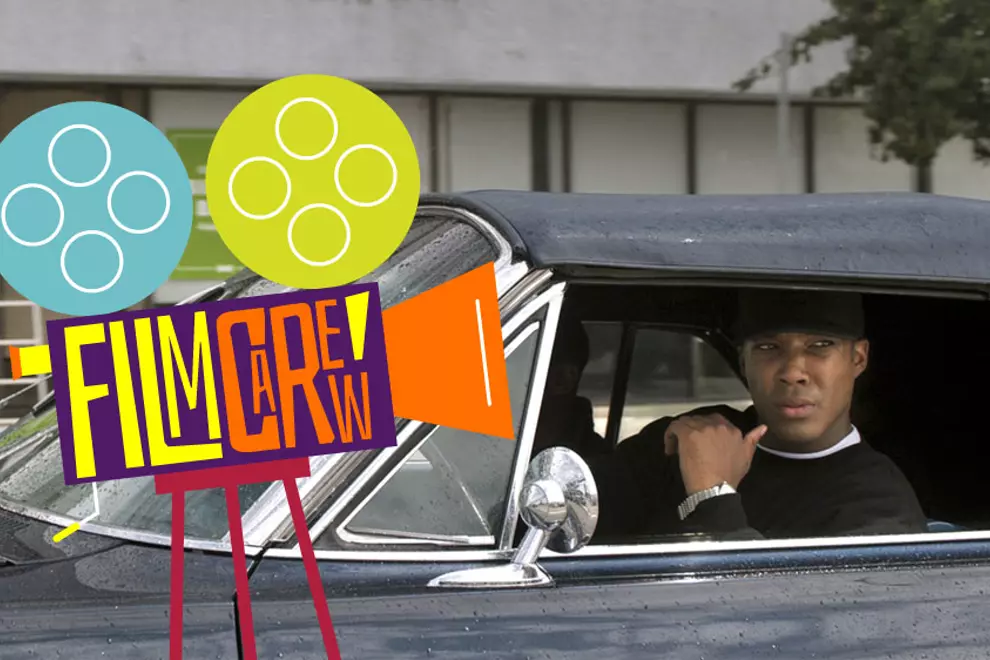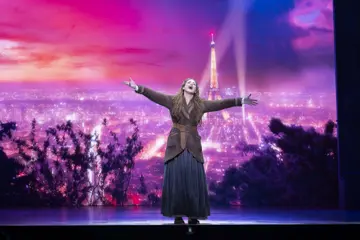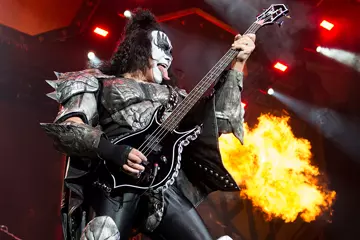STRAIGHT OUTTA COMPTON

In the closing credits to Straight Outta Compton, an elaborate video-montage postscript is tacked onto its rock-biopic portrait of the legendary, incendiary NWA, the godfathers of gangster-rap, whose enduring jam is the simple, eternal slogan Fuck Tha Police. This epilogue doesn’t do anything so prosaic as to convey after-The-End information, but functions as a glorifying celebration; the logical culmination to a film that plays like so much legacy-burnishing.
Just in case the actual ending of the film, the 1995 death of Eazy-E, seemed too sad a note to leave on, in the credits we see how Ice Cube and Dr. Dre have spent the past 20 years: the former going from Amerikkka’s Most Wanted to playing an endless string of cops, his acting star long-ago entrenched; the latter becoming hip hop’s ultimate mogul, grooming Eminem and 50 Cent and founding his wildly-successful, headphone-shilling Beats Electronic brand.
Given that both Ice Cube and Dr. Dre served as producers on Straight Outta Compton, this addendum feels a lot like boasting; an I-told-you-so reveal that, finally, silences the litany of doubters that dot the film. Every time a character/caricature herein tells the crew’s various members that their music will never amount to anything — that they’ll never get played on the radio, that they’ll never cross over to white America, that they’ll never make any money — it does so as a knowing joke for a smirking audience. When Dr. Dre is sleeping on his auntie’s couch, sad and broke, he’s like Steve Jobs soldering motherboards in his parents’ garage: a billionaire made, by familiar biopic trope, to go back to slumming it.
Don't miss a beat with our FREE daily newsletter
The film begins at NWA’s beginnings, in 1986, and proceeds with unwavering linearity, by the Behind-The-Music formula: the friends-in-a-garage beginnings, the breakout single, the classic album, the girls, the drugs, the egos, the fallout, the reconciliation, the legacy. Using a framing narrative to recount rock’n’roll tales is its own cliché (“Dewey Cox needs to think about his entire life before he plays”), but compared to the mosaic screenplay of, say, Tate Taylor’s Get On Up, the straight through-line plotting and workmanlike exposition of Andrea Berloff and Jonathan Herman’s script shows the lack of artistic ambition at play. This is a film that literally types the names of its principal characters on screen and reduces its few, fleeting female characters (WAGS, essentially) to speaking such workmanlike exposition aloud.
Cube (played by his own son, O’Shea Jackson Jr.) and Dre (Corey Hawkins) are, herein, the heroes of their own tale. Eazy-E (Jason Mitchell), NWA’s fallen son, is a figure of more conflict: the one-time drug dealer who bankrolls the band’s beginnings and presides unfairly over their finances. But, given that his end will surely be the film’s, there’s always the safe feeling that he, too, will have his legacy protected, if only because his widow, Tomica Woods-Wright, is another producer.
Oh, and there’s DJ Yella (Neil Brown, Jr.), who does nothing much but amiably laugh, and MC Ren (Aldis Hodge), who does nothing much but rap and has no discernible character and plays no part in the drama. Perhaps because he’s not wealthy enough, these days, to call narrative shots. Directing this is F. Gary Gray, who was 23 when he filmed Ice Cube’s It Was A Good Day video, and 26 when he shot Cube’s first starring film, 1995’s stoner comedy Friday; Gray as ‘inside’ a voice as any in NWA’s world.
The fact that a group of black men from rough-and-tumble LA have the means and clout to tell their own story on their own terms is a sign of changing times, given that, when they delivered the 1988 debut that gives the film its name, they were portrayed in the media as menaces to society. Of course, given the current state of American police violence, the change that’s suggested is not of greater social progress, just pop-cultural difference. Ninety eighty-eight was so long ago it was before hip hop became pop, the protagonists herein the first ghetto success stories who saw music as an entrée to diversifying portfolios. Gangster rap was swiftly packaged and sold, and two of NWA, at least, made out like bandits.
In spirit, plot and closing-credits montage, the bottom line of Straight Out Of Compton is the bottom-line. Once we get out of the charming making-the-band beginnings — the film’s best scenes, be it Ice Cube on stage at a local disco or Eazy-E literally trying to find his voice in the studio, coming then — money is the source of the drama.
The band’s manager (Paul Giamatti, in sweatpants and sweaty pallor, really staking out a music-biz-parasite corner after Love & Mercy) is suspected of taking the group for a ride, Eazy is evasive about where the money’s going, and Cube keeps yelling about his contract. It’s money that’s the root of all evil, and the falling out of these old friends. Cube and Dre going solo, Eazy starting to suspiciously cough like a tragic costume-drama heroine, the reliably-psychotic Suge Knight (R. Marcus Taylor, eyeballs buggin’) muscling in, in true rival-gangster fashion, for his cut.
When Ice Cube smashes up his record label president’s office with a baseball bat, it, too, is about money. It’s also the moment when the film starts to play like a showreel of apocryphal moments: that time a riot broke out at a show in Detroit, that time a fight broke out between posses at a Music Convention, that time Eazy and Dre threw their ‘Wet N’ Wild’ Party. Ice Cube writes Friday, Eazy-E calls Boyz N The Hood an after-school special, reformation overtures are made. You’re half-expecting to see Suge Knight hang Vanilla Ice off a balcony. The appearances of famous figures start to pile up to the point where this portrait of a ‘supergroup’ starts to feel like a Marvel team-up. Why bother getting Keith Stanfield, one of the most electric young actors in American cinema, to play Snoop Dogg if you’re not going to give him his own movie?
Ideally, though, you’d give him a movie better than this. Straight Outta Compton has been a wild commercial success by anticipating the pop-cultural zeitgeist, by tapping into musical nostalgia. While the film has, at times, an undeniable sense of energy, most of that is instilled by the songs: when Gray spins Express Yourself or shows Ice Cube cutting No Vaseline, there’s a real shock of life. But, outside of the jams, there’s less surety. When the Rodney King riots break out, Gray doesn’t know what to do with them; even though, at the time, both Ice Cube and Dr. Dre mined the situation, and its media coverage, for provocative material (We Had To Tear This Mothafucka Up and The Day The Niggaz Took Over, respectively).
What’s left is a portrait of a wildly-politicised group that rarely plays as political. Connecting the police brutality of then and now seems elementary, but there’s nothing, here, in the way of contemporaneous social critique. In 2015, Fuck Tha Police should resound as an anthem for the here-and-now, but in Straight Outta Compton it’s just another musical memory, of those distant days so long ago when Dr. Dre wasn’t even rich.
PLAY IT SAFE

Play It Safe is also about music-making and money, but the comparisons had best stop there. It’s the kind of Australian film you wish you’d see more often: made on a shoestring, crowdfunded, non-Government-granted budget in Melbourne with its drama low-stakes, its narrative progression suitably happenstantial, its inspiration taken from America’s mumblecore movement. Chris Pahlow sets his debut among musicians in Melbourne, giving it a sense of place that feels true and, depicted in black-and-white, its most obvious touchstone is Andrew Bujalski’s similarly-themed Mutual Appreciation (though Pahlow’s digital crispness has none of that movie’s shot-on-film roughness).
Play It Safe concerns the day-to-day travails of a 26-year-old musician (Nicholas Kato) dealing with the usual mid-twenties ails: sketchy job prospects, awkward romantic entanglements, the death of youthful idealism. Its essential dramatic device is whether or not Kato will give up on his rock’n’roll dreams and get a ‘real job’. The best moments come when Clayton Jacobson shows up as an everyman dad, lecturing his son about the value of a law degree and the imminent need for financial viability, functioning as the sensible naysaying parent eternal and giving a sense of actorly weight absent elsewhere.
This narrative arc is familiar fodder for cinematic Apatovian man-boys and is suggestive of how much Play It Safe, for all its ‘outsider’ bona fides, plays like a rom-com (complete with a wacky-best friend, Alasdair Tremblay-Birchall, getting all the best lines). Our protagonist effectively gets his choice — corporate safety or artistic liberty — embodied in the form of two women, Christine Lui and Maya Aleksandra, between whom he must also choose. Neither actress quite has the chops to make their characters come truly alive, and, combined with the gentle demeanour of Kato, the overall feeling is ineffectual, the emotions telegraphed, but never quite felt. This makes for a film of minor pleasures — in awkward comedy, in slice-of-life-ness, in wait-is-that-South-Yarra-train-station? recognition — but not much beyond that.
















